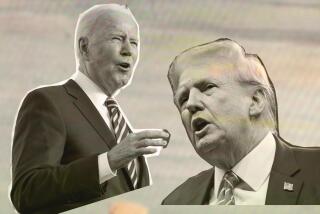Los Angeles Times Interview: Richard Armey : The House Minority Whip Battling Against the ‘Prags’ (for ‘Pragmatists”)
House Speaker Newt Gingrich (R-Ga.) calls Rep. Richard Armey (R-Tex.) the “chief operating officer” of the House of Representatives--the leader who keeps the legislative trains running on time and the workers toiling at their posts. But this conservative, tough-minded former economist could as easily be called “the enforcer,” for that is both his role in the Gingrich regime and the job that best fits his pugnacious personality.
Describing his relationship as second-in-command to Gingrich, House Majority Leader Armey likes to quote a lesson he’s learned from movie tough guy Dirty Harry. “A man’s got to know his limits,” says Armey. While out on the stump, Gingrich need never fear that Armey is “involved in some kind of a palace coup attempt” or working to water down the GOP’s conservative agenda.
On the contrary, the 54-year-old Armey, an economist, has been a key defender of conservative orthodoxy in the 104th Congress. Junior Republicans, concerned for the political heat that Democrats’ charges have generated, have pressed for changes in the House GOP’s tax-cut package and balanced-budget drive. Through it all, Armey has remained one of the leadership’s most ardent voices defending those packages from retreat. And, on Thursday, as congressional leaders struck a deal that virtually ignored President Bill Clinton’s budget proposal, the argument of hard-liners, such as Armey, carried the day.
“I see confrontation as a tool,” Armey said after he was elected, in 1992, chairman of the House Republican Conference. “If it becomes necessary, I am capable of using it.” Indeed, one of the most mordant political epithets Armey uses on members of his own party is to call them “prags”--shorthand for pragmatists.
Beneath his hard shell of partisanship and occasional crankiness, however, Armey can be an engaging man who boasts proudly of the accomplishments of his five children and sneaks out at 4 a.m. to fish in the Potamac--and then releases anything he catches.
In his 11-year House career, Armey has also been known to bring Republicans and Democrats from both ends of the political spectrum together--in campaigns to end farm subsidies and close unneeded military bases. While the latter has been a success, Armey’s five-year fight against farm subsidies may only begin to bear fruit this year.
In fighting farm subsidies, Armey forged an alliance--even a friendship, according to some--with the ultraliberal Massachusetts Democrat, Rep. Barney Frank. This friendship came under great strain this spring when Armey--in what he insisted was an innocent slip of the tongue--referred to Frank, who is openly gay, as “Barney Fag.”
Armey believes that House Republican leaders have devoted too much time to courting the press during the 104th Congress. But the majority leader, sipping one of dozens of cups of coffee he drinks a day, spent 40 minutes last week answering The Times’ questions in his vaguely monastic office in the Capitol.
*
Question: How much did President Clinton change the landscape when he proposed his own version of the 10-year balanced budget?
Answer: He made it easier to get where we need to go. For one thing, the President, essentially, conceptually, embraced everything we’re doing . . . . He’s given the Democrats in Congress heartburn because he’s made it more difficult for them to criticize what we’re doing.
Now you say, there’s a difference on the details and, most dramatically, [the goal of balancing the budget in] 10 years instead of seven . . . . I don’t think America’s going to say, “Oh, I get it. You could get there in seven years, but now you’re thinking about maybe waiting for another three? . . . I don’t think they’re going to like that.
. . . The President of the United States makes a recommendation. It should get full consideration. And if he’s got some useful recommendations, maybe we’ve got a couple of places where we can get some help . . . . But I don’t think there will be much of a discernible mark on the final outcome, because the details of his budget didn’t hold water . . . .
Q: How do you feel about the prospect of a major scale-back of your tax cut?
A: I may have a little more difficulty than most people--maybe I’ll have a lot more difficulty than most people. I’m a little discouraged at the number of people who fail to see the tax cut as something instrumental to sustaining the economy. The latest revelations we’ve had in the economic indicators have been unnerving. The tax increases of ’93 are coming home to roost in terms of the repressive effect on the economy. The only thing we have to encourage economic growth, or avert a recession, is tax policy.
My own view is that it is critically important that we move forward with it. So I’m not going to be much in a mood to give up the only economic growth muscle we’ve got. In terms of really getting that kind of energy injected into the growth cycle, it’s got to come from the tax cut. That’s all we’ve got.
Q: You’re the economics professor. Does it matter whether the budget gets balanced in seven years or 10 years?
A: It’s critically important, and I’ll tell you why. We now know from the President’s own commission that Medicare goes broke in seven years. Now we’re going to try to do something to repair that and fix it, and help along the way. But that still becomes a critical date.
Furthermore, within just a few years after that, you have got the same problem with Social Security. My point is very simple: Unless you get to a balanced budget prior to that point, you cannot cope with those problems. If we still are running deficits anywhere near the magnitude that we are now, our hands are tied. So it’s critical we get there by then.
Q: You were responsible for keeping troops in line during the first 100 days under the GOP’s “contract with America.” Now many House lawmakers are taking up more difficult and controversial issues, such as abortion, affirmative action and school prayer. How do you feel, as the person who maintains order around here, about bringing those issues up? How divisive are they?
A: We always like to focus on the numbers issues, because you always sort of have a sense of objectivity, but making public policy is a subjective process, too. The issues have to be dealt with.
The question of the rights of the unborn child, as it is set up against the question of the rights of a woman to govern her own body and all that: These are critically important and deeply heart-felt issues. There aren’t very many people who are casual about this. . . .
The question is, can you bring them up to the floor within an appropriate context and have a civil debate within and between the two parties? It’s the same problem on both sides. My view is that the Republicans handle their intraparty divisions on this subject better than the Democrats. But it’s got to be done. There ain’t no sense pretending that these issues aren’t real. They must be handled.
Now, you want to handle them, as I said, in as orderly a fashion as possible. I have no problem with that. I don’t sit here in a sort of trepidation that if these issues become part of our public-policy debate, that it destroys the party. I just don’t believe that. I think the party’s destroyed if it turns its back on critically important matters of public policy and says that’s too big and difficult for us to deal with.
We’re not hired to sit here and take just the easy issues. We’ll take them on.
Q: The public seems wary of many of the initiatives that the GOP continues to press, including a lot of the spending cuts you have proposed. Can House Republicans ride it out and still come out in the public’s good graces here?
A: I think so. I’m not worried too much about it. There’s a lot of noise, always a lot of noise. Obviously, the Democrat Party wants to say to the American people that Republicans are callous and indifferent to real people except their rich friends and all that party-line baloney goes on all the time. . . .
The problem with politicians is they’re all risk minimizers. Generally speaking, when a member of Congress is worried about the big risk, the risk is not that I lose my election, but that I’m getting cornered, having to take a lot of heat. We’re just going to have to stand in the face of all of this and say, “Enough! We must move forward.”
The other point I’ve made over the years, the big difference between Republicans and Democrats is the Republicans are always living with the dread fear that the public won’t understand; and the Democrats live with the dread fear that the public will understand. Or you could say conservatives, liberals--however you want to say it. The fact is, the public does understand. We need to always have confidence in that.
Q: What’s your assessment of the GOP’s ability to retain control in the House, and perhaps even consolidate its hold in the next election?
A: I believe that after the election, both the House and the Senate will have larger and more conservative Republican majorities. It’s going to be a significant increase. . . . But I wouldn’t want to jump on a number . . . .
Also, Democrats, to a greater degree, depend upon somebody giving somebody else’s money to finance their campaigns than Republicans. When you have that situation, and you have somebody who is making campaign contributions with somebody else’s money, this is almost always what I call a pragmatic [giver] who wants things like access, to be in on the inside ballgame. That’s where all their financial leverage historically in campaigns has come from.
Now all of a sudden, the worm has turned on them. They’re having a difficult time raising money. And they’re out of practice. And if they ever thought that raising money was tough, wait until they try raising money as the minority. That is a tough deal. And it’s just like anything else, if you’re out of shape and out of practice, it is very forbidding.
Q: You’ve been in the minority with the President from your own party for many years here in Washington. What’s your assessment of the relationship the Democrats have with the President?
A: It’s very difficult for them. They can’t feel like they can agree with what he’s doing. They can’t really publicly disagree with him. They can’t criticize him, they can’t explain him. It’s a very, very complex and difficult thing for them to deal with.
It seems to me, though, that the House and Senate Democrats . . . need to consolidate themselves, and they need to start really developing ideas and initiatives and proposals. They’re going to have to sooner or later come to terms with an understanding that the politics of fear don’t work any more.
People are tired of hearing it--the politics of class conflict. People are just worn thin on it. I think they would be much better off, and much more effective, if they would present ideas and initiatives, things that they’re for. They’re starting to come off as people who sit and carp all the time.
I don’t know what you do about that with respect to the presidency. It’s always a dilemma. But they do have a separate division of government, a separate identity. They’re not doing very well in that.
Q: You’ve been at this now close to 200 days. Is there anything you’ve learned about the institution, or your role in the institution, that is new and surprising?
A: I have to tell you one thing I’m amazed at. Knock on wood, we have, it seems to me, avoided successfully--and are learning habits to maintain an avoidance of--the most debilitating problems the Democrats were plagued with, things like jurisdictional jealousies among committees and so forth.
They could tie themselves up to the point where they couldn’t get a bill to the floor because of jurisdictional disputes. For the most part, we’re avoiding that.
Q: Meanwhile, you Republicans are still feeling your way in your relationship with the Democrats?
A: The Democrats are trying to learn what is the proper, courteous, respectful way to make sure that minorities are included, and I think they appreciate that, by golly, these guys are always trying.
I have an idea, it takes a lot longer to come to terms with being in the minority for the first time in your life than it does to be in the majority for the first time in your life.
A lot of our people thought the Democrats were awful cranky. The point is, the toughest thing in life is learning to manage your disappointment. They just had an unexpected, bitter disappointment. Some person sitting there who is going to be the chairman, finally, after their 15 or 20 years, all of a sudden, hey, my prize just got dragged away. Do you expect them to come here with a smile on their face saying, “Boy, am I glad to be here”?
Look at Dick Gephardt. I give him a lot of credit. Dick Gephardt, on Nov. 7, had every expectation that he was going to be the Speaker. I think he’s had an awful lot of good grace handling that much disappointment. I’d like to believe I could be that gracious about it.
More to Read
Get the L.A. Times Politics newsletter
Deeply reported insights into legislation, politics and policy from Sacramento, Washington and beyond. In your inbox three times per week.
You may occasionally receive promotional content from the Los Angeles Times.






